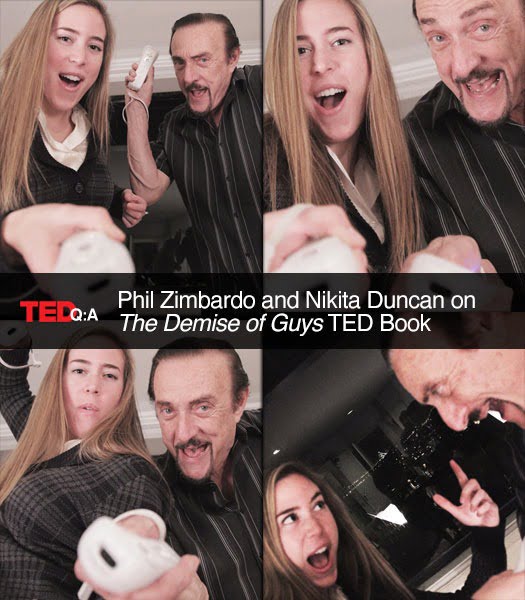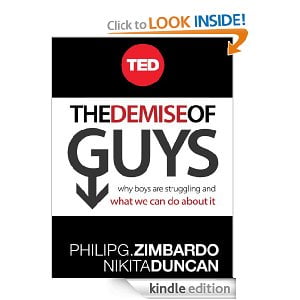If you saw Zimbardo’s 5-minute, powerful TED talk The Demise of Guys? you may want to know that he and his co-author Nikita Duncan have expanded it into a short TED Book. The book, The Demise of Guys: Why Boys Are Struggling and What We Can Do About It, goes beyond the talk—not only elaborating on it but also pointing to solutions.
It’s refreshing to see mainstream psychologists, steeped in the Western sexology model, tackle the “arousal addiction” challenge today’s young adults are facing, without downplaying, or exaggerating, the risks of addiction. Human brains haven’t evolved to resist the constant novelty of the Internet with ease, and for some the result is personally injurious.
Training one’s brain to constant stimulation-on-demand is leaving many of today’s guys out of sync with traditional teaching methods and the natural pace of romantic relationships. The latter, according to the authors, require interaction, sharing, developing trust and suppression of lust at least until “the time is right.”
The authors acknowledge that reversing the phenomenon will require concerted efforts of educators, gamemakers, parents, guys and gals. They even recommend that every porn video should have a 15-second ad on safer sex practices or resources that users can easily refer to if they suffer from porn addiction, much as casinos offer resources to those with gambling addiction.
However, the authors also have advice for guys themselves:
What guys can do Turn off your digital identity and turn on yourself. Learn how to dance, rediscover nature, make a female friend, monitor social interactions to be sure others are being listened to adequately and sufficiently, learn to tell jokes and practice conversation openers. Practice the art of making others feel special by giving justifiable compliments—one a day for the next week. Find people who possess traits you want to have and study their lives, find living role models or mentors, and find something in the real world that motivates you. The world wants you; in fact, the world needs you more than you know.
Turn off the porn. Clarify your relationship with porn so you can avoid its downsides. … If you find you are having trouble getting turned on by real people, you need to stop watching porn for at least a small period of time. There’s really no way around it. The good news is, your brain can heal. [Here they point readers to www.yourbrainonporn.com and summarize its content.]
The book is refreshingly daring in some ways. For example, consider this plug for using sexual energy for achieving higher values:
Beyond porn, having sex on your mind all the time or as a big part of your identity is actually a good thing—a lot of very successful people have very high sex drives—but you need to learn how to rechannel your sex energy out of lust and into the heart and mind, where it can serve your higher values instead of just your primal instincts. When transforming sexual energy into thoughts and actions of another nature, you have to use willpower to visualize and mindfully direct that energy.
 This was perhaps my favorite passage, in light of all the amazing transformations we have seen in collecting material for www.yourbrainonporn.com:
This was perhaps my favorite passage, in light of all the amazing transformations we have seen in collecting material for www.yourbrainonporn.com:
Our culture loses something important when we, as a population, are less able to think critically, delay gratification, or define and achieve meaningful personal and social goals. Technology especially needs to be embraced, but how we embrace it may make the difference between healthy and unhealthy human interaction.
Read a Q&A with the authors on TED Blog.
Watch a clip of Duncan’s interview on CNN.
